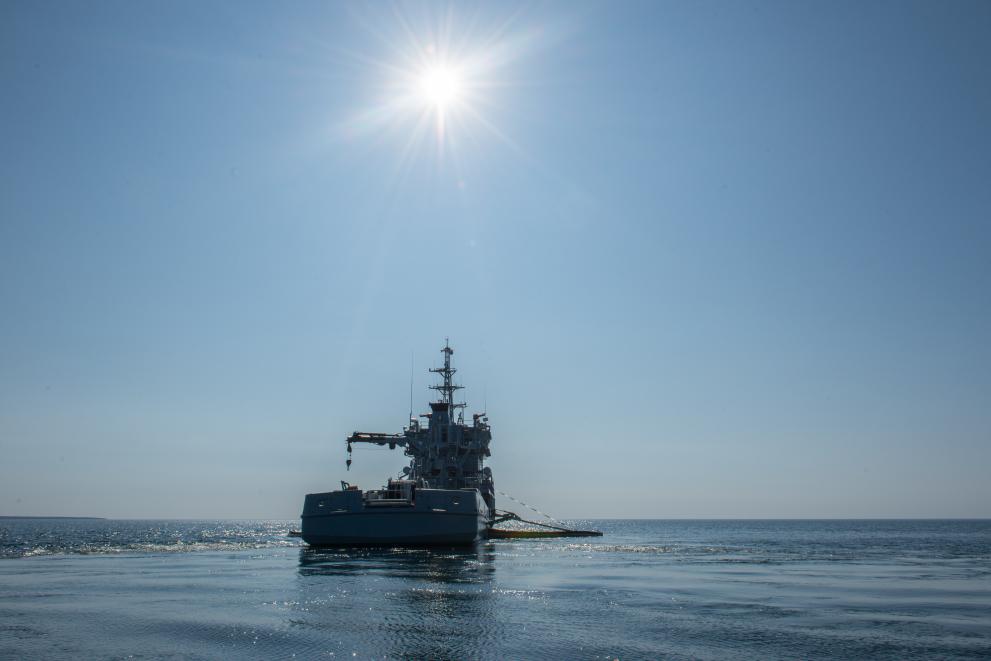
A ministerial meeting held in Riga on Thursday marks the 50th anniversary of the Helsinki Convention and HELCOM, established to protect the marine environment of the Baltic Sea since 1974.
As a contracting party to the Convention, the EU has been supporting countries to cooperate closely when it comes to improving the state of the Baltic Sea.
The Ministerial meeting will showcase years of shared expertise and support through a regional action plan for a clean and healthy Baltic Sea which was established in 2021.
Ahead of the gathering, Virginijus Sinkevičius, Commissioner for Environment, Oceans and Fisheries said:
"Knowledge gives us the power to find and implement solutions. Through this knowledge we know that our beloved Baltic Sea is in a bad environmental state. This is alarming news for the people from and around the Baltic Sea, as HELCOM has estimated it costs the region around €5.6 billion per year.
"Our best hope to clean up the Baltic is through regional co-operation and working together, as we do in HELCOM and as all Baltic Sea EU Member States committed to in Our Baltic Declaration in 2020.
“I fully support the work done by HELCOM, which provides us with a platform to work on solutions together.
It is our duty in the EU to provide the necessary support, so these solutions can be implemented. I look forward to the day when we can jointly say that our Baltic Sea has achieved a good environmental status."
Ministers will debate the key findings from the Convention's third report on the state of the Baltic Sea (HOLAS3), which shows that there was little improvement in the state of the Baltic Sea between 2016 and 2021, despite efforts made.
A ministerial declaration will reiterate contracting parties’ commitment to work regionally in reducing human pressures on the Baltic Sea and improve the effectiveness of their protection efforts, including through the designation and effective management of additional marine protected areas.
During the current mandate, the European Commission has organised two editions of the “Our Baltic Conference” in 2020 and 2023.
Background
HELCOM is the governing body of the Convention on the Protection of the Marine Environment of the Baltic Sea Area, known as the Helsinki Commission. It was created in 1974 and was the first convention ever to address all sources of pollution of an entire sea. HELCOM has ten Contracting Parties, comprising of eight EU Member States (Denmark, Estonia, Finland, Germany, Latvia, Lithuania, Poland and Sweden), the EU and the Russian Federation. Latvia currently holds the Chairmanship of HELCOM. The European Commission, on behalf of the EU, took over the Chairmanship between 2016 and 2018.
The EU and HELCOM are close partners aiming to improve the state of the marine environment in the Baltic Sea, so much so that even the objective, achieving good environmental status, is a shared one.
EU law, notably the Marine Strategy Framework Directive, requires Member States to put in place marine strategies to achieve this objective, which covers various ‘descriptors’ of the marine environment, such as maintaining biodiversity, keeping fisheries sustainable, and tackling eutrophication, marine litter and contaminants. It looks at all pressures on the seas and ocean and brings them together under one umbrella to tackle the cumulative impacts of human activities in one strategic framework.
Importantly, EU law states that EU Member States must work regionally to have clean, healthy and productive seas. Hence, regional cooperation, such as the one performed through regional sea conventions like HELCOM, are indispensable for EU Member States to fulfil their EU environmental legal requirements. The Marine Strategy Framework Directive is currently being reviewed.
The EU has also financially supported HELCOM on various projects, such as Helcom Action and Helcom Blues, that identify and put in place effective measures and actions for maintaining marine biodiversity, reducing marine litter, and mitigating underwater noise in the Baltic Sea.
Due to Russia’s war of aggression on Ukraine, HELCOM is currently on a “strategic pause”, meaning that all official meetings of HELCOM bodies and meetings of project groups with Russian involvement under HELCOM were suspended, as Russia is nominally also a contracting party to the convention. Despite the strategic pause, HELCOM work continues in the so-called ‘H9 format’ with the eight Member States and the EU.
Related links
Details
- Publication date
- 25 April 2024
- Author
- Directorate-General for Environment

